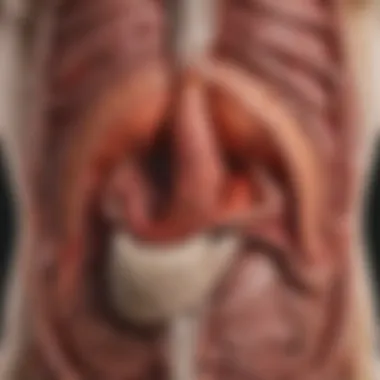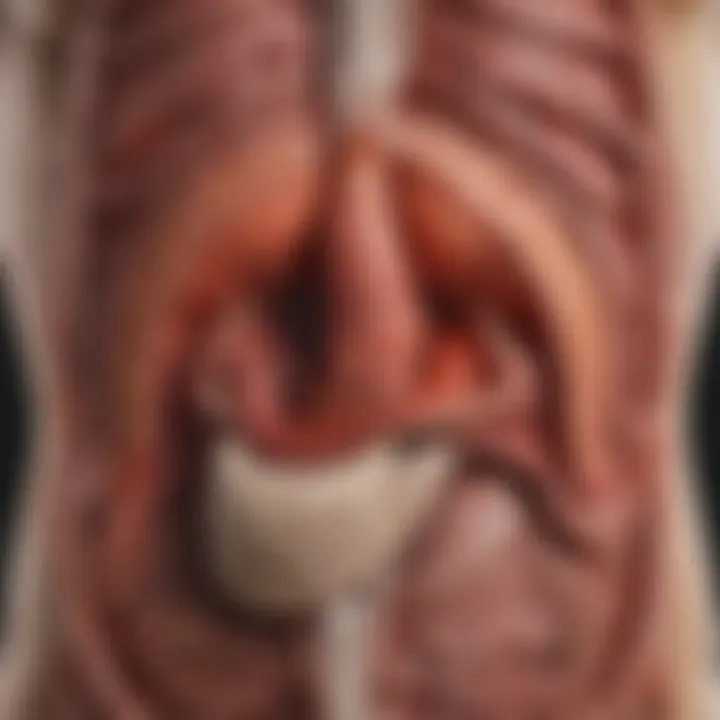Understanding the Causes of Frequent Burping


Intro
Burping, a common bodily function, often raises questions of its origins and implications. While it can be a simple sign of digestion at work, frequent burping signals a more complex interplay of dietary, physiological, and lifestyle factors. In understanding the reasons behind excessive burping, we prepare to simplify a natural process that many find embarrassing or concerning.
The act of burping, also known as belching, primarily involves the expulsion of air from the stomach through the mouth. This can happen after eating or drinking too quickly, consuming certain foods, or even talking while eating. Moreover, it can sometimes indicate underlying issues with digestion and gastrointestinal health.
Understanding the Importance of Burping
"Burping is a normal part of digestion, but frequent occurrences often indicate dietary or physiological issues that can be addressed."
Recognizing why frequent burping occurs is essential, not just for personal comfort but also for overall health. Many people overlook this bodily function, rarely considering its potential implications. Learning about the causes can lead to better dietary choices and lifestyle adjustments, enhancing one's quality of life.
In this article, we aim to dissect the various factors contributing to repeated burping. By examining the dietary habits people might overlook, physiological aspects of the human body, and even cultural attitudes towards burping, we can equip readers with both knowledge and practical solutions.
In summary, frequent burping might seem like a trivial concern, but its causes deserve a closer inspection. This exploration will help individuals to not only understand their digestive processes better but also to find ways to reduce discomfort. With the right insights and understanding, managing this common issue can be straightforward and effective.
Understanding Burping
Burping is a natural physiological response that many find to be an embarrassing occurrence. Understanding burping is essential because this basic function of the digestive system can signify various underlying issues. By grasping its significance, one can better navigate dietary choices and lifestyle habits to reduce occurrences and improve overall digestion.
Definition of Burping
Burping, or belching, is the release of gas from the digestive tract through the mouth. This gas is primarily composed of air that has been swallowed, along with other gases produced during digestion. The sound and sensation associated with burping can vary, depending on the amount of gas released and the pressure in the stomach. In general, occasional burping is considered normal; however, frequent burping may indicate potential digestive disturbances.
Burping can occur after meals or beverages and might be more common following the consumption of carbonated drinks or certain foods. In some cultures, burping can even carry social significance, indicating enjoyment of a meal. This aspect alone highlights the complex interplay between bodily functions and cultural perceptions.
Physiological Mechanism
The act of burping is governed by specific physiological mechanisms involving various organs. When food enters the stomach, it is mixed with digestive juices and begins to break down. During this process, air can be trapped in the stomach due to swallowing or the effervescence of carbonated beverages. The body has a system to regulate this excess gas, often manifested as burping.
This process involves:
- Swallowing Air: It is easy to intake air while eating or drinking too quickly, leading to air accumulation in the stomach.
- Muscle Contraction: The diaphragm and abdominal muscles work together to expel the gas, creating a pressure differential that allows burping to occur.
- Esophageal Function: The lower esophageal sphincter (LES) relaxes, permitting gas to exit through the esophagus and out of the mouth.
Understanding these mechanisms can aid individuals in recognizing factors that might increase burping frequency and help in making informed dietary and behavioral choices.
Common Causes of Burping
Understanding the common causes of burping is essential, as it plays a significant role in both personal health and social interactions. Frequent burping can be a source of embarrassment and discomfort for many individuals. Identifying its triggers can help manage and mitigate this issue. Furthermore, recognizing how dietary influences and habits contribute to burping aids in making informed lifestyle choices.
Dietary Influences
Carbonated Beverages
Carbonated beverages are a notable contributor to burping because of their gas content. When individuals consume sodas or sparkling water, they inadvertently swallow air along with the drink. The key characteristic of carbonated beverages is their effervescence, which is produced by dissolving carbon dioxide in liquids. Such drinks are popular choices due to their refreshing nature. However, the unique aspect of carbonated beverages is the increased abdominal pressure caused by the trapped gas, which often results in burping. This effect can lead to discomfort for some, making moderation important.
Dairy Products
Dairy products also play a significant role in causing frequent burping for many people. Many individuals consume milk, cheese, or yogurt without realizing their potential to cause digestive issues. The lactose present in these products can lead to bloating and gas production, especially in those who are lactose intolerant. Dairy products are popular for their nutritional value and taste, but they can be problematic for some individuals. Hence, being aware of one’s tolerance to dairy is crucial in managing burping.
Spicy Foods
Spicy foods can provoke burping by stimulating the digestive system more vigorously. Ingredients such as chili peppers can irritate the stomach lining, leading to increased acid production. The hallmark of spicy foods is their intense flavors, which can be delightful for many. However, they can also lead to gas buildup, resulting in burping episodes. This unique characteristic calls for balance and caution among food lovers, as frequent consumption might bring discomfort.
High-Fiber Foods
High-fiber foods are recognized for their health benefits, but they can also contribute to burping in certain cases. When consumed in large quantities, fiber can promote gas production as it ferments in the digestive tract. Foods such as beans, lentils, and whole grains are high in fiber and often promoted for their ability to support digestion. Their beneficial aspects in terms of dietary health are evident, yet the downside lies in the potential for increased gas and subsequent burping. It is advisable to gradually incorporate these foods into the diet to minimize discomfort.
Swallowing Air


Eating Habits
Eating habits significantly influence the likelihood of swallowing air, which can lead to burping. Rushing through meals or talking while eating promotes the ingestion of air. The critical characteristic of mindful eating is its focus on slowly savoring each bite. This approach can be beneficial as it reduces the chances of swallowing excess air. Individuals who adopt healthier eating habits may notice a decrease in their burping episodes, offering a straightforward method for improvement.
Behavioral Patterns
Behavioral patterns also play a vital role in the swallowing of air. Habits such as chewing gum, smoking, or drinking through a straw can increase air intake significantly. The notable aspect of these patterns is their often unconscious nature, making awareness essential. Many people may not realize how their lifestyle choices impact their digestive health. Recognizing and modifying these behaviors can lead to considerable improvements in managing burping.
Medical Conditions Associated with Burping
Understanding the medical conditions that may lead to frequent burping is crucial. Frequent burping often signals underlying health issues that require attention. By identifying these conditions, individuals can manage their symptoms more effectively. This section will explore three prominent medical issues often linked to excessive burping: Gastroesophageal Reflux Disease, Irritable Bowel Syndrome, and Hernias. Each condition presents unique challenges and implications for daily life.
Gastroesophageal Reflux Disease (GERD)
Gastroesophageal Reflux Disease, known as GERD, is a chronic digestive condition. It occurs when stomach acid frequently flows back into the esophagus. This acid reflux can lead to irritation and uncomfortable symptoms, including excessive burping. Individuals with GERD may notice that certain foods exacerbate their symptoms. Spicy or fatty foods, as well as caffeine and alcohol, can often trigger increased acid production, leading to more burping.
Moreover, GERD can significantly impact quality of life. People affected might experience discomfort, difficulty swallowing, or even sleep disruptions due to nighttime reflux. Diagnosing GERD typically involves a medical history review and possibly an endoscopy to assess the esophagus's condition. Treatment may include dietary changes, medications, or, in some cases, surgery.
Irritable Bowel Syndrome (IBS)
Irritable Bowel Syndrome, or IBS, is another condition that can cause frequent burping. This functional gastrointestinal disorder affects the large intestine. Symptoms vary widely but often include abdominal pain, bloating, and indeed, excessive gas. People with IBS might burp frequently as their digestive system struggles with certain foods.
The connection between IBS and burping often relates to food intolerance or sensitivity. For example, high-fat meals or dairy can trigger symptoms in sensitive individuals. Managing IBS typically involves dietary adjustments, stress management, and sometimes medications. Understanding one's specific triggers is essential for managing this condition.
Hernias
Hernias occur when an organ or tissue pushes through a weak spot in the abdominal muscles. There are many types of hernias, but hiatal hernias are especially relevant to burping. In a hiatal hernia, a portion of the stomach moves above the diaphragm. This displacement can cause acid reflux and, subsequently, burping.
Hernias can lead to discomfort and additional complications if left untreated. Individuals might need to change eating habits to avoid exacerbating symptoms. Surgical intervention may be necessary for severe cases, indicating the importance of consulting a healthcare professional for proper diagnosis and management.
In summary, recognizing the link between these medical conditions and burping is essential. Awareness can empower individuals to seek appropriate treatment and make lifestyle adjustments for better digestive health.
Cultural Perspectives on Burping
Understanding the cultural aspects of burping is important as it provides insights into how societies view this natural bodily function. Each culture has its unique attitudes towards burping, which can range from being a sign of appreciation to being considered rude. This section aims to unravel these perspectives, shedding light on how cultural norms shape individual behaviors and societal expectations related to burping.
Cultural Acceptability
Western Societies
In many Western societies, burping is typically seen as impolite, especially in formal dining settings. The cultural expectation is to suppress any burp quietly, as it may be viewed as a sign of bad manners. This attitude can lead to social discomfort, especially when it occurs unexpectedly. Western countries often emphasize etiquette and social norms during mealtimes, which directly impacts how individuals manage their bodily functions.
However, there are exceptions. In more relaxed settings, such as family gatherings, a light-hearted approach to burping may exist, especially among close friends where the atmosphere is more informal. The key characteristic here is that burping is generally considered a private matter, not something that is openly discussed.
Asian Cultures
In contrast, Asian cultures can often embrace burping as a sign of satisfaction after a meal. In countries like China and Japan, a burp may indicate that one has enjoyed the food, and it can be seen as a compliment to the cook. This aspect of cultural acceptability can promote a more relaxed dining atmosphere, allowing individuals to express their satisfaction openly. The unique feature of this tradition is the positive connotation associated with the act of burping, suggesting a deeper appreciation for the meal consumed.
This cultural difference highlights the disconnect between Western and Asian perspectives on bodily functions. It shows how cultural background can affect the interpretation of a natural process like burping, which may seem trivial yet is loaded with social meaning.
Middle Eastern Traditions
Middle Eastern traditions also offer a distinct viewpoint. Burping, particularly after a meal, may be viewed favorably in some contexts, indicating that one has had enough food. Moreover, hospitality is a major aspect of Middle Eastern culture, and if a guest burps, it is often taken as a sign that their needs have been met. This characteristic promotes a sense of community and shared experience during meals.
However, nuances do exist. In formal gatherings, excessive or loud burping may still be frowned upon, particularly if it disrupts the social flow. The balancing act between celebration of food and adherence to etiquette reflects the complexities of cultural norms in different societies.
Burping Etiquette
Burping etiquette varies widely across cultures and settings. Understanding this can help individuals navigate social interactions smoothly. In Western cultures, individuals may often excuse themselves quietly after a burp, while in Asian cultures, expressing satisfaction openly is more appropriate. This awareness can prevent misunderstandings and foster more respectful interactions during meals.
Ultimately, cultural perspectives on burping emphasize how social norms can influence personal behavior. Each culture has distinct traits that define burping, shaping how it is perceived and responded to in various situations. Understanding these cultural intricacies allows for better cross-cultural communication and appreciation.


Lifestyle Factors Affecting Burping
Burping can be influenced not only by what one consumes but also by lifestyle factors. Understanding these can help individuals manage and potentially reduce the occurrence of burping. Many people do not consider daily habits when thinking about this issue. By exploring these factors, one can foster a more holistic view of digestive health.
Stress and Anxiety
Stress and anxiety can significantly affect digestion. The body’s response to stress includes the fight-or-flight mechanism, which can alter how the stomach processes food. When a person is anxious, they might swallow more air, leading to increased burping. Moreover, stress can lead people to consume comfort foods or eat faster, which can also cause more air swallowing.
"Stress impacts every aspect of health, including digestion."
To address this, engaging in relaxation techniques, such as meditation or deep-breathing exercises, can be helpful. These practices can not only reduce anxiety but also encourage mindful eating, allowing one to be more aware of their eating habits.
Smoking and Alcohol Consumption
Smoking and alcohol consumption are two lifestyle factors that can exacerbate burping. Smoking introduces air into the digestive system and irritates the stomach lining. This irritation can lead to increased gas production and subsequent burping. Furthermore, tobacco can affect the muscles at the top of the stomach, which function to keep acid in and food out of the esophagus. This can lead to digestive discomfort.
On the other hand, alcohol can relax the lower esophageal sphincter, making it easier for gas and stomach contents to escape. Alcoholic beverages can also increase the production of stomach acid, which complicates digestion further.
Considering these habits is crucial for anyone experiencing frequent burping. Reducing or eliminating smoking and moderating alcohol intake can lead to less gas production and improved digestive comfort.
Remedies for Reducing Burping
Understanding effective remedies for reducing burping is crucial, as it directly impacts daily comfort and social interactions. This section focuses on practical strategies individuals can adopt to mitigate excessive burping. Each approach is valuable in its way and may help create a more pleasant experience during meals and afterward. Remediating this common issue often involves evaluating dietary habits, modifying behaviors, and possibly seeking medical support.
Dietary Adjustments
Identifying Trigger Foods
Identifying trigger foods is a fundamental step in alleviating frequent burping. Certain foods can lead to increased gas production or excessive air swallowing. These foods may include beans, broccoli, and carbonated beverages. Recognizing which items consistently cause discomfort can lead to significant relief. This approach is beneficial because it helps individuals create personalized meal plans that minimize these specific irritants.
The key characteristic of identifying trigger foods is its focus on individualized nutrition. Instead of following broad dietary guidelines, this method encourages self-awareness and active participation in one’s eating habits. The unique feature of this method is its customization potential; as each person reacts differently to food.
"Knowing your body’s responses to food enables better dietary choices, which may reduce excessive burping."
The advantage is the potential for immediate effects, while the downside may be the time and attention required to figure out one’s specific triggers.
Portion Control
Portion control plays a significant role in managing burping. Eating large quantities of food can lead to overeating and increased air ingestion, both of which trigger burping. Practicing smaller portion sizes can lead to more enjoyable eating experiences while reducing discomfort caused by excessive fullness.
The key characteristic of portion control is its simplicity. Adjusting the amount of food consumed is a straightforward method anyone can use. This strategy is beneficial as it encourages a slower pace of eating, allowing for better digestion.
The unique feature lies in its accessibility; it requires no specialized knowledge to implement. One main advantage is that portion control can lead to improved overall digestion and metabolic health. Nonetheless, some may find it challenging to adjust to smaller portions initially.
Behavioral Changes
Mindful Eating
Mindful eating involves paying full attention to the eating experience. This practice encourages people to savor food and chew thoroughly, which can minimize swallowed air. Being aware during meals makes digesting smoother and reduces the likelihood of burping.
The key characteristic of mindful eating is its intentionality. This choice empowers individuals to engage more deeply with their food, fostering a healthier relationship with eating. Mindful eating offers benefits such as improved digestion and greater satisfaction from meals.
The unique feature of this approach is its focus on mental engagement as much as it is on physical consumption. The advantages include creating a positive dining experience and reducing stomach discomfort. However, some might find it difficult to slow down in fast-paced environments.
Hydration Practices
Proper hydration practices can also inform the way burping occurs. Drinking adequate water throughout the day supports digestion and helps prevent excessive air ingestion, especially when paired with meals. The act of sipping rather than gulping can further minimize intake of air.
The key characteristic of this approach is its emphasis on hydration as an everyday practice rather than a reactive measure during meals. Adequate water intake is beneficial for overall health and can help eliminate digestive discomfort when used correctly. The unique aspect is that staying hydrated supports bodily functions aside from digestion. Hydration can sometimes be overlooked, but its advantages extend beyond simply managing burping. A downside could be that overhydration may happen if one is not careful.


Medical Interventions
Over-the-Counter Medications
For individuals seeking immediate relief, over-the-counter medications can be an effective option. Products like simethicone may help to reduce gas buildup in the stomach, leading to less frequent burping. They can be a beneficial support tool for those who have not yet identified specific triggers.
The key characteristic of over-the-counter medications is their accessibility. Many can be purchased without a prescription, making them a popular choice for quick relief. One advantage is the immediate impact these medications can have. However, excessive reliance on them may mask underlying issues rather than resolve them.
Consulting a Physician
In some cases, persistent burping may indicate a more serious underlying condition. Consulting a physician is vital for identifying any medical concerns that contribute to excessive burping. Health professionals can offer personalized advice based on an individual’s specific health history and symptoms.
The key characteristic of consulting a physician is the comprehensive approach to health that it promotes. It connects dietary habits with medical insights, making it a beneficial choice for thorough understanding and treatment. The unique feature lies in personalized diagnostics through testing and assessments, which can provide clarity on what’s causing frequent burping.
The advantage is professional support can lead to more effective management of symptoms, while the disadvantage could be the potential cost or time involved in waiting for appointments.
Exploring these remedies offers a holistic approach to tackling frequent burping, incorporating dietary, behavioral, and medical strategies. Adjustments made in these areas not only target the symptom of burping but can also improve overall digestive health and well-being.
When to Seek Professional Help
Understanding when to seek professional help regarding frequent burping is crucial. Some cases may stem from benign causes, while others could indicate serious underlying health issues. If burping becomes persistent or is accompanied by concerning symptoms, consulting a healthcare provider is necessary.
This step can lead to appropriate diagnosis and treatment, preventing potential complications. Moreover, recognizing when to seek assistance underscores the importance of gut health and can guide individuals toward healthier dietary and lifestyle choices.
Identifying Symptoms of Concern
Symptoms that may warrant a visit to a healthcare professional include:
- Persistent or excessive burping that disrupts daily life.
- Abdominal pain or discomfort alongside burping.
- Unexplained weight loss or difficulty swallowing.
- Changes in bowel movements, such as diarrhea or constipation.
- Frequent heartburn or acid reflux symptoms.
These signs can indicate underlying conditions that require medical attention. If individuals observe any of these symptoms in conjunction with heavy burping, it is best to not ignore them.
Diagnostic Approaches
Understanding diagnostic methods helps clarify the root cause of excessive burping. Two common approaches include endoscopy and allergy testing.
Endoscopy
Endoscopy is a procedure that allows doctors to view the upper digestive tract. It involves inserting a thin, flexible tube with a camera through the mouth. This method is valuable for diagnosing issues like esophageal disorders or gastritis.
- Key characteristic: Provides direct visualization of the digestive tract, allowing for accurate diagnosis.
- Benefits: It can identify potential problems that may contribute to excessive burping, such as inflammation or structural abnormalities.
- Unique feature: It allows for the possibility of simultaneous treatment, as doctors can remove polyps or take biopsies during the procedure.
- Disadvantages: It may be uncomfortable for some patients and carries a small risk of complications, such as bleeding or infection.
Allergy Testing
Allergy testing assesses for food sensitivities or intolerances that could lead to increased burping. It includes skin or blood tests to identify specific allergens.
- Key characteristic: Focuses on the immune response to potential food triggers.
- Benefits: Helps determine if particular foods are causing digestive issues and whether adjustment is needed.
- Unique feature: This testing can guide dietary modifications to alleviate symptoms.
- Disadvantages: False positives can occur, leading to unnecessary dietary restrictions.
In summary, recognizing symptoms of concern and understanding diagnostic approaches allows individuals to take informed steps towards resolving frequent burping.
The End
Understanding the causes and implications of frequent burping serves as a vital aspect of our overall digestive health. The article has presented a framework for identifying factors that contribute to this common, yet often overlooked, bodily function. From dietary influences and medical conditions to cultural perceptions and lifestyle factors, we have explored various dimensions that could impact the frequency and intensity of burping.
Summary of Key Points
In summary of our discussion:
- Physiological Mechanism: Burping, while a natural process, can signal underlying issues when excessive.
- Common Causes: Diet, lifestyle, and even behavior can play significant roles in how often we burp.
- Cultural Perspectives: Attitudes toward burping vary widely across cultures, influencing societal norms and personal behavior.
- Remedies for Reducing Burping: Practical adjustments, from diet changes to mindful eating practices, can greatly alleviate the issue.
- When to Seek Help: Recognizing symptoms that warrant professional advice is crucial for long-term health management.
"Knowledge of burping causes empowers individuals to make informed choices and seek help when necessary."
Encouragement for Personal Exploration
Every individual experiences burping differently, making it essential to reflect on one’s own habits and health. I encourage readers to take proactive steps in identifying personal triggers and remedies. Keeping a food diary, noting instances of burping, and recognizing patterns can provide valuable insights. This self-discovery journey can lead to better management of discomfort and a more pleasant dining experience.
Furthermore, don’t hesitate to discuss any concerning symptoms with a healthcare professional. Knowledge and awareness are powerful tools in navigating health issues, including those as common as burping. Explore your own eating habits, cultural associations with burping, and lifestyle choices to cultivate a more understanding approach to this natural process. By gaining insights into your unique physiological responses, you empower yourself to make informed decisions for a healthier, more comfortable life.



